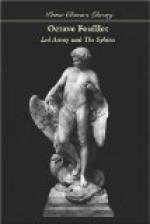They were not less dissimilar in a moral point of view; the former a jolly companion, an absolute and settled skeptic, the careless possessor of a danseuse; the latter always agitated despite his outer calm, romantic, passionate, tormented with love and theology. Pierre de Moras, on their return from America, had presented Lucan to his cousin Clotilde, and from that moment there were at least two points upon which they agreed perfectly; profound esteem for Clotilde, and deep-seated antipathy for her husband.
They appreciated, however, each in his own way, Monsieur de Trecoeur’s character and conduct. For the Count Pierre, Trecoeur was simply a mischievous being; in Monsieur de Lucan’s eyes, he was a criminal.
“Why criminal?” Pierre said. “Is it his fault if he was born with the eternal flames on the marrow of his bones? I admit that I feel quite disposed to break his head when I see Clotilde’s eyes red; but I would not feel any more angry about it, than if I were crushing a serpent under my heel. Since it is his nature, the poor man can’t help it.”
“That little system of yours would simply suppress all merit, all will, all liberty; in a word, the whole moral world. If we are not the masters of our own passions, at least to a great extent, and if, on the contrary, it is our passions that fatally control us; if a man is necessarily good or bad, honest or a knave, loyal or a traitor, at the mercy of his instincts, tell me, if you please, why you honor me with your esteem and your friendship? I have no right to them any more than any one else, any more than Trecoeur himself.”
“I beg your pardon, my friend,” said Pierre gravely; “in the vegetable world I prefer a rose to a thistle; in the moral world, I prefer you to Trecoeur. You were born a gallant fellow; I rejoice at it, and I make the best of it.”
“Well, mon cher, you are laboring under a complete mistake,” rejoined Lucan. “I was born, on the contrary, with the most detestable instincts, with the germ of all vices.”
“Like Socrates?”
“Like Socrates, exactly. And if my father had not chastised me in time, if my mother had not been a saint, finally, if I had not myself placed, with the utmost energy, my will at the service of my conscience, I would be to-day, a faithless and lawless scoundrel.”
“But nothing proves that you will not turn out a scoundrel one of these days, my dear friend. There is no one but may become a scoundrel at the proper time. Everything depends upon the extent and strength of the temptation. Whatever may be your instinct of honor and dignity, are you yourself quite sure never to meet with a temptation sufficiently powerful to overcome your principles? Can you not conceive, for instance, some circumstance in which you might love a woman enough to commit a crime?”
“No,” said Lucan; “do you?”
“I!—I deserve no credit. I have no passions. It is extremely mortifying, but I have none. I was born to be an exemplary man. You remember my childhood; I was a little model. Now I am a big model, that’s all the difference—and it does not cost me any effort whatever. Shall we go and see Clotilde?”




